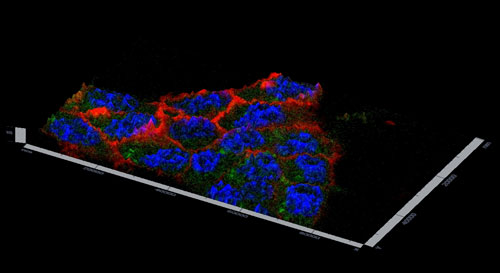| Posted: Aug 26, 2015 |
3D Vision for the next generation of biomaterials
(Nanowerk News) The University of Nottingham is to lead a £6.5m research project which aims to make the leap from 2D to 3D in the development of advanced materials and realise the true potential of regenerative medicine and medical devices for the future.
|
|
With £5.4m from the Engineering and Physical Sciences Research Council (EPSRC) and another £1.1m from The University of Nottingham Professor Morgan Alexander, in the School of Pharmacy, and his multi-disciplinary team of experts across the University will collaborate with leading international groups to realise the vision of materials discovery in 3D, while aiming to keep the UK ahead in the global materials competition.
|
|
Professor Alexander said: “Advanced biomaterials are essential components in targeting infectious diseases and cancers. Without this leap beyond 2D screening methodologies we will miss new advanced materials because they omit architecture and often poorly represent the in vivo environment. We aim to move beyond the existing limited range of generic bio-resorbable polymeric drug and cell delivery agents to bespoke materials identified to function for specific applications.”
|
|
Materials have become an integral part of modern medicine, used to target the delivery of drugs, expand and deliver cells in regenerative medicine, and to construct a wide variety of medical devices. Over the last decade there have been huge advances with the stage now set for developing the next generation of biomaterials.
|
 |
| A confocal micrograph showing HCT 116 cancer cells containing drug delivery nanoparticles. (click on image to enlarge)
|
|
Next generation biomaterials discovery
|
|
Advances have been made through both hypotheses relating material properties to cell response, and the discovery of new materials made using high throughput screening. Despite these advances, rational design of new biomaterials is hindered by the paucity of information on the physicochemical parameters governing the response of all cell types of interest to a broad range of materials. Defining chemistry, stiffness, topography and shape can control the response of cells to materials. This programme will focus on producing and testing large libraries of these attributes in the form of patterned surfaces, particles and more complex architectures.
|
|
New materials will be identified for application in the areas of targeted drug delivery, regenerative medicine and advanced materials for next generation medical devices. The exploitation of the resulting lead materials will be undertaken with our network of clinical and industrial end users in existing and future projects.
|
|
The team will also investigate and develop materials that can work around the abilities of bacteria and microbes to sense and signal to each other. This could have application in the field of antimicrobial resistance.
|
|
Professor Alexander’s research will bring together, Cameron Alexander, Professor of Polymer Therapeutics, Kevin Shakesheff, Professor of Advanced Drug Delivery, and Martyn Davies, Professor of Biomedical Surface Chemistry in the School of Pharmacy; Richard Hague, Professor of Innovative Manufacturing and Tissue Engineering, Ricky Wildman, Professor of Multiphase Flow and Mechanics, and Derek Irvine, Associate Professor in Chemical Engineering in the Faculty of Engineering; Paul Williams, Professor of Molecular Microbiology and Amir Ghaemmaghami, Professor of Immunology and Immuno-bioengineering in the School of Life Sciences; and Chris Denning, Professor of Stem Cell Biology and Dr Anna Grabowska in the School of Medicine. The University funding will also support 12 new PhD studentships.
|
|
Co-Director Professor Cameron Alexander, Professor of Polymer Therapeutics and Head of the Division of Drug Delivery and Tissue Engineering in the Faculty of Science, said: “This is a great opportunity to address unmet clinical need by identifying new biomaterials targeted to specific applications. We are really excited about having resources to lead an ambitious programme of this scope. There is real potential for targeting drugs to cancers and to infection sites, for new material-guided cell therapies to treat difficult conditions such as cardiac damage, and for innovative medical devices which can reduce infection rates.”
|
|
Minister for Life Sciences George Freeman said: “From regenerative medicine through to the next generation of cutting-edge medical devices, biomaterials will be essential components of 21st Century healthcare. This £5.4 million government investment will help researchers at The University of Nottingham to develop ground breaking new techniques that will speed up the discovery and application of these increasingly important materials.”
|
|
Professor Philip Nelson, EPSRC’s Chief Executive, said: “The development of new advanced materials is vital to extending our capabilities across a wide range of scientific disciplines. The work planned as part of this programme grant promises to find new materials that will have many applications in the healthcare sector. This grant will support some of the UK’s talented scientists and help achieve EPSRC’s vision to make the UK the best place in the world to research, discover and innovate.”
|

